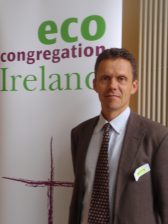 Prof David Horrell has provided these notes based on what he said during the public talk on ‘God’s Creation – Our Responsibility?’ at Eco-Congregation Ireland’s inaugural conference:
Prof David Horrell has provided these notes based on what he said during the public talk on ‘God’s Creation – Our Responsibility?’ at Eco-Congregation Ireland’s inaugural conference:
One of the workshops I attended during the conference reinforced the importance of a change in values and ethics – a new sense of what human flourishing is. Rethinking and reshaping our religious traditions is one important contribution to trying to face the challenges of an age of ecological crisis.
In my lecture at the conference (see https://www.ecocongregationireland.com/archives/3632) I highlighted both the difficulties in deriving “green” ideas from the Bible and also the rich potential of biblical texts to contribute to what I called the ecological reconfiguration of Christian theology and ethics. This requires not just “reading” the texts, but critical, constructive, focused, and imaginative work.
I want to try and illustrate how such work might proceed by looking at Paul – an important figure to grapple with, since he is so influential among the voices of the New Testament and the first Christian theologian to articulate the meaning of what God had done in Jesus Christ. In doing this I sketch some of the ideas in a book I co-wrote with Exeter colleagues during our project on the Bible and Environmental Ethics (Greening Paul, Baylor University Press, 2010).
There are two favourite “eco-texts” in Paul: Romans 8.19-23 and Colossians 1.15-20. Romans 8 in particular is very frequently quoted, and is important in expressing both the idea of creation’s groaning and also the hope that all creation will one day share in the liberation and freedom that God intends. Colossians 1 speaks of the reconciliation of all things in Christ.
An important question is whether these can be more than isolated proof texts. A traditional focus in readings of Paul has been on justification by faith, a focus in which the imagery of the law-court, with guilt and acquittal, is prominent. Can there be a new lens to refocus Pauline theology and ethics in a way more relevant and appropriate to an ecological age?
In 2 Corinthians 5.19 Paul speaks about God “reconciling the world to himself in Christ”. Elsewhere in Paul we find a kind of pan-en-theistic vision of all things incorporated into God, or into Christ (e.g., 1 Cor 15.28). We may, I think, suggest that the centre of Paul’s theology could be seen as God’s saving act in Christ to restore and reconcile all things – an act which has universal and cosmic scope.
But would such a theological vision also entail ethical responsibility on the part of humans? It’s pretty clear that Paul’s ethics are focused on Christian congregations. And a central value in his ethics is the call to love, or what I think we can label “other-regard” – looking to the interests and welfare of the other. Does this apply only within the church, or only to other humans? This is one area where we can use Paul to think beyond, perhaps even against, Paul.
Paul seems to imply that the calling of the Church is to live out, to anticipate, the patterns of reconciled relationships that characterise the new creation. Paul does not, however, see or specify that this might imply responsibilities beyond the human community. Given the priorities of our own context and location, we can discern such implications in Paul’s vision: if the community encompassed by reconciliation in Christ includes and encompasses “all things” – literally everything – then the community to which our moral responsibilities relates includes all things without limit.
We have an obligation to seek well-being, peace, reconciliation and flourishing not only for other humans, but also for other creatures – and perhaps for ecosystems, landscapes, habitats and so on, too. It is, of course, not straightforward to work out what that might mean in practice: Isaiah’s vision of wolves lying down with lambs is all very well, but wolves and lions cannot subsist on a vegetarian diet. Nonetheless, one might develop a vision of reconciliation in which there was, say, space for all creatures to flourish without the threat of extinction. Paul does not provide a blueprint for ecotheology and ethics, but he can perhaps play some part in resourcing an ecological theological vision that inspires responsible living in our world.
